- Home
- Anthony McGowan
Shark Adventure Page 2
Shark Adventure Read online
Page 2
‘It doesn’t sound like much of a holiday destination.’
‘Oh, don’t worry about the name. They were given that by mariners in the eighteen hundreds, because the locals back then were a little unfriendly, and there wasn’t much in the way of supplies. It’s all very different now …’
And then the aeroplane began its dramatic descent through the clouds and craggy peaks, and the Trackers were awed into silence.
From the airport Bluey hired an open-top jeep and drove them to the sleepy island capital of Taipivai. It was the most spectacular drive of Amazon’s life – and, given that she’d recently ventured into the forests of Siberia, that was actually saying something. All around her she could see the mountains climb almost vertically up until their tops were lost in the clouds. At times the clouds flowed down the thickly forested slopes to envelop the road, like silent avalanches, drenching the hair of the passengers in something that was neither mist nor rain.
‘I tell you, Amazon,’ said Frazer, ‘I’ve been to some truly stunning places in my time – I’ve seen the Himalayas and Mount Kilimanjaro, and the Rockies, and I’ve dived on the Great Barrier Reef in Australia, but I’ve never seen anything like this.’
There was something else that struck Amazon.
‘Have you noticed that there aren’t any people?’ she said. ‘I don’t mean like a desert … you know, one of those places where people have never lived. It’s as if there were once people here, but they’ve all gone away. Kind of spooky.’
‘Yeah,’ Frazer nodded. ‘Now that you mention it, it does seem haunted. What’s the story, Bluey?’
‘It’s a sad one. But I’m not the guy to tell it. The weather’s too crummy for hanging out by the beach, so I’ll hook you up with a guide later on while I go to charter the boat to take us on to Uva’avu. He’ll give you the low-down.’
So, later that morning, Bluey left them at a little French café by the waterfront, while he went to find transportation for the final leg of the journey.
He checked his watch anxiously. ‘The guide’ll be here in a few minutes. Sorry to leave you, but I’ve got to find us that boat, and I’ve a feeling it won’t be easy.’
Amazon wasn’t quite sure what yams and cassava were, but she half expected to breakfast on them (or something similarly tropical). However, the café, like much of the island, had been greatly influenced by French culture, and so they munched their way through croissants washed down with hot chocolate. As they ate, they gazed out of the window, watching the dark clouds build over the ocean, like armies preparing for battle.
And then a reflection appeared in the window, and it was so strange and so startling that for a moment Amazon thought it was something she’d imagined, or a trick of the light. But, when she and Fraser turned round, they discovered that it was very real indeed.
He was a giant of a man, young, tall and straight, and with muscles bulging beneath his frayed and faded T-shirt. Black eyes stared out from under a heavy brow, and his face wore a look of fierce dignity and haughty pride.
But neither his features nor his physique were what marked out the man. It was that every centimetre of visible skin was covered in intricate tattoos. Patterns of giddying complexity curled over his arms, neck, face and legs. Amazon thought that they might represent flowers and plants and animals and, as she stared, the shapes seemed almost to move, to writhe and swirl as if they were alive.
‘I am Matahi,’ said the man, in a voice as deep and resonant as the ocean.
‘Oh, hi,’ said Frazer, his voice sounding even lighter and merrier than usual in contrast to the Polynesian’s dark rumble. ‘You must be the guide that Bluey talked about.’
Matahi said nothing, but his head made a small movement, which seemed to indicate that yes, this was so.
‘Follow,’ Matahi commanded, and turned to walk out of the café.
Amazon and Frazer looked at each other.
‘Are we sure this is a good idea …?’ Amazon whispered.
‘Er, yeah, I guess so. Why, don’t you?’
‘Oh, I don’t know. It’s just, well, he’s a bit weird …’
‘You mean the tattoos? That’s the custom here. Lots of the people have them – you must have noticed.’
It was true – many of the native Marquesans had tattoos on their arms and faces.
‘But not like him … And it’s not just the tattoos, it’s … well, our guide’s not exactly the cheeriest person I’ve ever met.’
Frazer was about to answer, but he became aware that the tall Polynesian had returned.
‘Can you ride horse?’ he said.
‘Yes,’ Amazon replied, suddenly very interested. ‘Why …?’
‘I have,’ said Matahi, and pointed outside, ‘horses best for this island. Roads are not good. Petrol is much money. Come.’
And suddenly Amazon’s qualms and concerns were completely forgotten. Matahi led them to a paddock just outside the town, where three scruffy horses flicked their tails at flies and munched on wet grass.
But Frazer and Amazon didn’t care if the horses were scruffy. They both loved riding, although Frazer was by far the more experienced of the two. In fact, they had first truly bonded when Frazer took Amazon riding back on the Hunt farm on Long Island.
Amazon chose a grey mare and Frazer a rather grumpy chestnut stallion, and soon they were saddled up and trotting along the dirt trails that wound up through the dense tropical forest.
Once they got away from the coast, they were struck again by how the land seemed almost completely deserted. They came across many strange ruins half hidden in the trees and tangled undergrowth. There were huge stone platforms, as big as tennis courts, that Matahi said were called rua.
‘I had no idea that there were structures like this in the South Pacific,’ said Frazer. ‘What were they used for?’
‘Feasts. Worship. Sacrifice.’
‘Sacrifice?’ said Amazon. ‘You mean like animals …?’
Matahi grunted, and kicked his horse.
A little later, they passed through an area of such dense forest that they had to lead their horses. Frazer found himself at the front. He was much bothered by the tiny, almost invisible biting flies, called no-nos by the locals, as well as by the dangling leaves that snagged his floppy hair and the tangles of thorns that caught his clothes.
And then, suddenly, as he swatted at visible and invisible pests, he came face to face with a demon. It loomed out of the gloom like a monstrous frog, with its wide, leering mouth, and great goggling eyes, set in a fat head on top of a squat body and short, crouching legs.
Frazer let out a yelp: he just couldn’t help himself. The thing – whatever it was – made him think of the imaginary monsters that used to lurk in his wardrobe or under his bed, waiting to reach out and grab him with long, bony fingers as soon as his dad had finished tucking him in and left the room.
It could have been worse – at least he hadn’t screamed – but it was enough to make the horse he was leading rear and snort.
‘What is it?’ said Amazon, who was a few paces behind him.
As she spoke, the strong figure of Matahi surged past her, an old but still sharp machete in his hand. Then he stopped and emitted a strange, low gurgling sound. It took Amazon a moment to realize that he was laughing. She stepped forward and finally got to see what all the fuss had been about.
The monster was a statue. Ugly and somehow malevolent, but essentially harmless, unless you believed that such things had special powers.
Frazer had just about recovered his cool.
‘Who’s this guy?’ he asked. ‘Looks a bit like one of the girls in
my class …’
‘Girl …?’ replied the Polynesian. ‘No, not a girl. He is Tiki, the first man and the father of men. The great god Tāne made him from earth mixed with blood and … what is the word for this?’ Matahi spat on the ground.
‘Spit.’
‘Spit. Yes, spit. Earth and blood and spit. Or so my people once believed, before the missionaries came.’
‘Earth mixed with blood and spit,’ Frazer repeated. ‘Nice. Anyone else hungry?’
Despite the gross image conjured up by Matahi’s words, Amazon realized she was starving. They had forgotten to bring any provisions, but Matahi brought them to a grove of fruit trees, and they ate bananas and mangoes and papaya, plucked straight from the branches.
‘You thirsty?’ asked Matahi when they had eaten their fill of the fruit.
Amazon and Frazer nodded eagerly, and then watched in admiration as Matahi opened up two green coconuts with a few deft cuts of his machete.
‘What do you think?’ asked Frazer, wiping his lips. ‘Beats the heck out of Coke, doesn’t it?’
Amazon was too busy gulping down the delicious liquid to respond.
The meal had been pleasant enough, but their attempts to engage the guide in conversation fell flat, so they were both happy to get moving again. They rode on through the eerily silent woods, glared at by more of the Tikis and much harassed by the no-nos, as well as the more usual kind of mosquitoes.
After an hour, they came to a stone-lined pit dug at the foot of one of the valleys.
‘What was this used for, Matahi?’ asked Frazer.
‘For storing.’
‘Storing what? Food?’
Matahi smiled a rather grim smile.
‘In a way, yes. When there was war between the valleys, captives would be kept here. Their legs and arms would be broken so they could not escape. And then they would be killed and …’
‘Please do not say “eaten”,’ said Amazon, her face filled with horror.
‘Eaten? Why, yes, eaten.’
‘But I thought that was all just made up by the missionaries. I mean all the stuff about cannibals …?’
Matahi shrugged. ‘There used to be a hundred thousand Marquesans on these islands. Our culture was one of the finest in the Pacific. We built great halls and palaces, the remains of which you have seen. Our navigators sailed thousands of miles to Easter Island and Hawaii and New Zealand. Also to islands further south – one of them was my home …’
Matahi paused for a moment, as if remembering something deeply sad. Then he continued: ‘But yes, there was also warfare between us, and if a warrior was captured by his foes he knew his fate. When the Europeans came, the warfare ended. But that was because those of us who were not killed with your guns were killed by your germs. Disease took so many. A hundred thousand became two thousand.’
Suddenly Amazon understood why the valleys seemed so silent and haunted.
‘Now I will show you one of our great sacred sites. I promise you will not be … sorry.’
They mounted their horses again, and rode up a valley that started out as merely spectacular and then soon went beyond that, to a place where only mute wonder could do it justice. The valley grew deeper and deeper, until Amazon and Frazer were staring up at immense emerald walls, like the buildings of some city built by an alien civilization. The broken remains of statues, houses and temples added to the strangeness, the glory and the desolation.
Soon Amazon’s neck was strained by all the craning up she was doing, so she paid attention to the delights lower down. Huge ferns reached up to caress her legs; palm trees drooped to tickle her cheeks. Branches offered ripe fruit for her to pluck, and strange, gaudy flowers for her to admire. Unfamiliar birdsong filled the valley, and an occasional flash of red or deep blue showed as one of the island’s parrots flickered across their path.
After an hour, they came to an open area of tussocky grass, almost like an English flower meadow. And it was only now that they noticed the sound that had, in fact, been getting steadily louder for some time.
‘Is it the ocean, Matahi?’ asked Frazer, looking puzzled. ‘Only I thought that we’d come in the opposite direction, and that the sea was back that way somewhere …’
Matahi permitted himself a slight smile, and led on, without answering. They rounded a huge buttress protruding from the cliff, and beheld beyond it a waterfall that seemed to cascade down from heaven itself – a stream of pearlescent water, glittering with countless miniature rainbows. It was not the great spreading expanse of Niagara, but a perfect white line, like a cord linking the sky and the earth. And it fell so far and so precipitously that the water vaporized to fine spray before it reached the pool at its base.
‘Oh, Matahi,’ sighed Amazon, ‘this really is beautiful. What is it called?’
‘The palagi – that is, foreigners – call it Vaipo Falls, but in our tongue it is Ahuei.’
‘I’ve read about this,’ said Frazer. ‘It’s one of the highest waterfalls in the world. And it’s got to be the coolest. Can we swim in that pool at the base, Matahi? I mean, it’s not taboo, or forbidden or anything …?’
Matahi looked as if such frivolous notions as swimming in freshwater pools would never occur to him, but he nodded, nevertheless.
‘It is not taboo.’
And so Frazer and Amazon in shorts and T-shirts ran and leapt from a rock into the deep, cool waters of the pool at the foot of the graceful Ahuei Falls.
And then, as if propelled by a butt-rocket, Amazon shot out again, dripping and emitting a high-pitched yelp. Frazer bobbed up in the middle of the pool.
‘What is it, Zonnie? Water too cold for you?’
Amazon was indeed shaking. But not from the cold.
‘B-b-b–’
‘What are you talking about?’
‘B-b-b-big s-s–’
‘I can’t hear what you’re saying. Stop jabbering, girl.’
Fury cured Amazon’s stammer. ‘There’s a giant snake in there. And I hope it blinking well eats you!’
‘There aren’t any giant snakes in Polynesia,’ said Frazer, although he did begin to look nervously around himself as he trod water, in a way that suggested that he wasn’t entirely convinced of the truth of that statement. ‘In fact,’ he added, growing a little more confident, ‘there aren’t any snakes at all in Polynesia.’
And then the water around Frazer began to bubble and seethe, almost exactly as if it were a pan coming to the boil.
And Frazer was the egg in the middle.
Frazer may not have screamed when he saw the grim idol that Matahi had called Tiki, but now he went into panic mode, yelping and splashing and generally totally losing his cool.
‘Matahi, help him!’ Amazon shouted, regretting her earlier statement about the pleasure she’d take if Frazer were eaten by the snakes – and it was most definitely plural, she now saw. The bubbling was caused by a mass of writhing, pale grey creatures, long and sinuous, but also thick and immensely strong.
‘Boy needs no help. These are not snakes,’ said Matahi. He sat on a rock and began to peel a banana.
‘Not snakes …?’
‘Eels.’
‘But those things are huge …’
‘Giant eels.’
‘But … but …’
‘It’s OK, Zonnie,’ came a voice from the pool. Frazer had managed to recover his composure. ‘They seem pretty friendly. They’re nibbling at my toes, but not in an eating me kind of way. More like they’re playing. You should come in, it’s fun.’
Amazon looked at Matahi, who was finishing his banana.
‘My people used to think that the
eels were good spirits. They would feed them. Some still do. It is why they are so big. And, like the boy say, they are friendly. Take this, give.’
Matahi handed Amazon a piece of fish. She paddled back into the pool, and instantly found herself surrounded by the long, sleek eels. She held the fish under the water, and immediately they swarmed round her hand. And yet there was no piranha-like feeding frenzy. They rather politely took nibbles, each waiting their turn, like well-brought-up children.
‘I guess they’re used to this,’ said Frazer.
When it was all finished, the giant eels slithered away into the darker depths of the pool, and Amazon and Frazer swam and dived in the clear water, washing away the grime and sweat of the day.
It was late afternoon by the time they got back into the town.
Bluey was waiting for them in the hotel lobby. He ruffled Frazer’s hair, and said, ‘Oh, great, I see the guide found you after all – I got some message from reception saying he’d missed you in the café.’
‘He sure did find us,’ replied Frazer. ‘Interesting guy, in a gloomy sort of a way. Did you get hold of a boat?’
Bluey’s face fell.
‘Struck out. It’s not really the sailing season, and there aren’t any crewed yachts to hire, and none of the locals are prepared to take us out all the way to Uva’avu. They seemed to be worried about the weather, but this isn’t the time of year they usually get cyclones.’
‘What’s a cyclone?’ asked Amazon.
‘I can tell you that,’ said Frazer. ‘It’s what they have instead of hurricanes in the South Pacific. A huge storm, circling round an area of low pressure. You can see them from space. They are undoubtedly the coolest big storms in the universe.’
‘Not so cool if you’re caught up in one, Fraze,’ smiled Bluey a little ruefully. ‘I’ve seen whole islands that have been obliterated by one of those babies. But, like I said, it’s not that time of year. Maybe the locals were just trying to drive the price up, but I’ve got to be careful with the TRACKS credit card.’

 Brock
Brock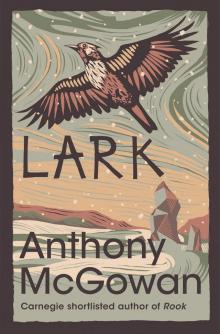 Lark
Lark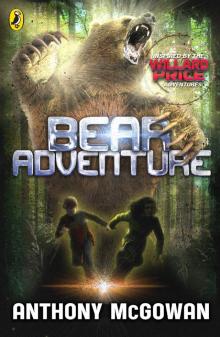 Bear Adventure
Bear Adventure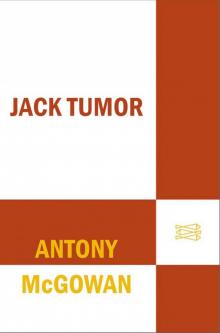 Jack Tumor
Jack Tumor Einstein's Underpants--And How They Saved the World
Einstein's Underpants--And How They Saved the World The Bare Bum Gang Battles the Dogsnatchers
The Bare Bum Gang Battles the Dogsnatchers The Bare Bum Gang and the Football Face-Off
The Bare Bum Gang and the Football Face-Off The Knife That Killed Me
The Knife That Killed Me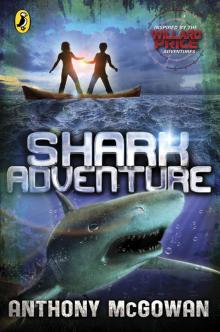 Shark Adventure
Shark Adventure Hello Darkness
Hello Darkness The Bare Bum Gang and the Holy Grail
The Bare Bum Gang and the Holy Grail Leopard Adventure
Leopard Adventure The Bare Bum Gang and the Valley of Doom
The Bare Bum Gang and the Valley of Doom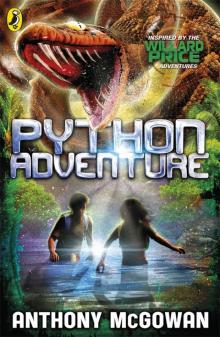 Python Adventure
Python Adventure